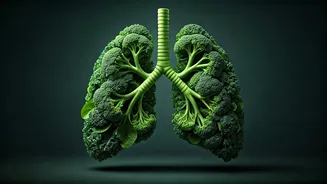Food's Effect on Lungs
The food we consume daily can significantly influence our lung health, sometimes in ways we don't realize. Certain food types possess properties that can either
support or hinder the respiratory system's efficiency. Several foods can contribute to inflammation, mucus production, and airway constriction, all of which directly impact the ease and effectiveness of breathing. It is essential to be aware of how various dietary choices affect our respiratory health, allowing us to make informed decisions that promote lung wellness. This understanding is key to nurturing a respiratory system that is strong, functional, and resilient against potential health challenges. This knowledge empowers individuals to adopt proactive measures, paving the way for improved lung health and overall well-being. Recognizing the intimate relationship between diet and respiratory function will allow individuals to embrace a more health-conscious lifestyle.
Dairy's Impact on Lungs
Dairy products, though a dietary staple for many, can be problematic for respiratory health. Dairy is often associated with increased mucus production, which can make it more challenging to breathe for some individuals. The high levels of casein found in dairy may trigger an inflammatory response in certain people, which leads to increased inflammation in the airways, potentially worsening conditions like asthma or chronic bronchitis. For some, reducing dairy intake leads to a noticeable reduction in mucus production, leading to improved respiratory function. Exploring dairy alternatives can therefore be a beneficial step toward improving lung health, particularly for those sensitive to these products. Experimenting with dairy alternatives, such as almond or soy milk, can often lead to improved respiratory comfort and overall well-being.
Processed Foods and Airways
Processed foods are often packed with additives, preservatives, and high levels of sodium, all of which pose risks to lung health. These foods tend to be high in trans fats and refined carbohydrates, which contribute to widespread inflammation throughout the body, including the respiratory system. The additives and preservatives used in processed foods may directly trigger airway inflammation and increase mucus production. High sodium intake leads to fluid retention, which can exacerbate respiratory symptoms. A diet rich in processed foods can worsen conditions like asthma and chronic obstructive pulmonary disease (COPD), making breathing more difficult. Cutting down on processed foods and opting for whole, unprocessed foods is a proactive step towards supporting lung health and reducing the burden on the respiratory system.
Sugary Foods and Lungs
Excessive consumption of sugary foods and drinks can also negatively affect lung health. High sugar intake promotes inflammation in the body, which can extend to the respiratory system, exacerbating existing conditions or contributing to the development of new ones. Sugar weakens the immune system, making the lungs more vulnerable to infections. Chronic inflammation triggered by sugar can also damage the delicate tissues of the lungs over time. The inflammatory response caused by sugar intake might narrow the airways, making breathing harder. Reducing the intake of sugary foods and beverages can contribute to mitigating inflammation and protecting lung health. This is a crucial step towards safeguarding the respiratory system from potential damage and enhancing overall respiratory function.
Salty Foods and Breathing
High sodium intake is detrimental to lung health, leading to fluid retention and potentially increased inflammation within the airways. Excess salt can worsen symptoms for those with conditions like asthma or COPD. This fluid buildup can make breathing feel harder and more labored. The inflammatory effects associated with high sodium intake can damage lung tissue over time. Avoiding excess salt in the diet is therefore critical for lung health. When salt consumption is controlled, it contributes to better breathing and overall lung function. Reducing sodium intake requires vigilance in food choices, including minimizing processed foods and choosing fresh, whole foods whenever possible, and reading food labels carefully.
Fried Foods and Airways
Fried foods are often cooked in oils that produce harmful compounds when heated to high temperatures. These compounds can inflame the airways, leading to breathing difficulties and exacerbating respiratory conditions. The high-fat content of fried foods can trigger inflammation throughout the body, including the lungs. Frequent consumption can also contribute to weight gain, putting extra strain on the respiratory system. The process of frying introduces trans fats and other unhealthy elements that may worsen asthma and other respiratory issues. Minimizing fried foods is essential for maintaining and improving respiratory health. Choosing healthier cooking methods and opting for fresh, unprocessed alternatives can provide several health benefits.
Alcohol's Respiratory Effects
Alcohol consumption can significantly impact the respiratory system. It can interfere with the lungs' natural defense mechanisms, making them more vulnerable to infections. Excessive alcohol intake can also lead to inflammation in the airways, making it harder to breathe, particularly for those with pre-existing conditions. Alcohol affects the immune system, and it diminishes the body's ability to fight off respiratory infections. Chronic alcohol use might weaken the muscles involved in breathing. Limiting alcohol consumption is crucial for protecting lung health. For those with respiratory conditions, moderation or abstinence is often recommended to prevent further complications. This ensures that the lungs are protected and can function optimally.













